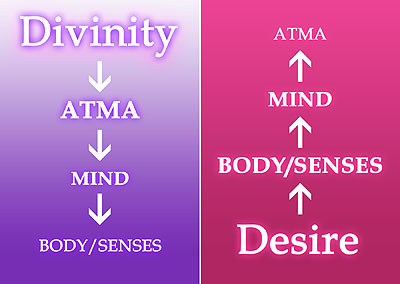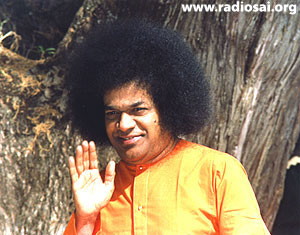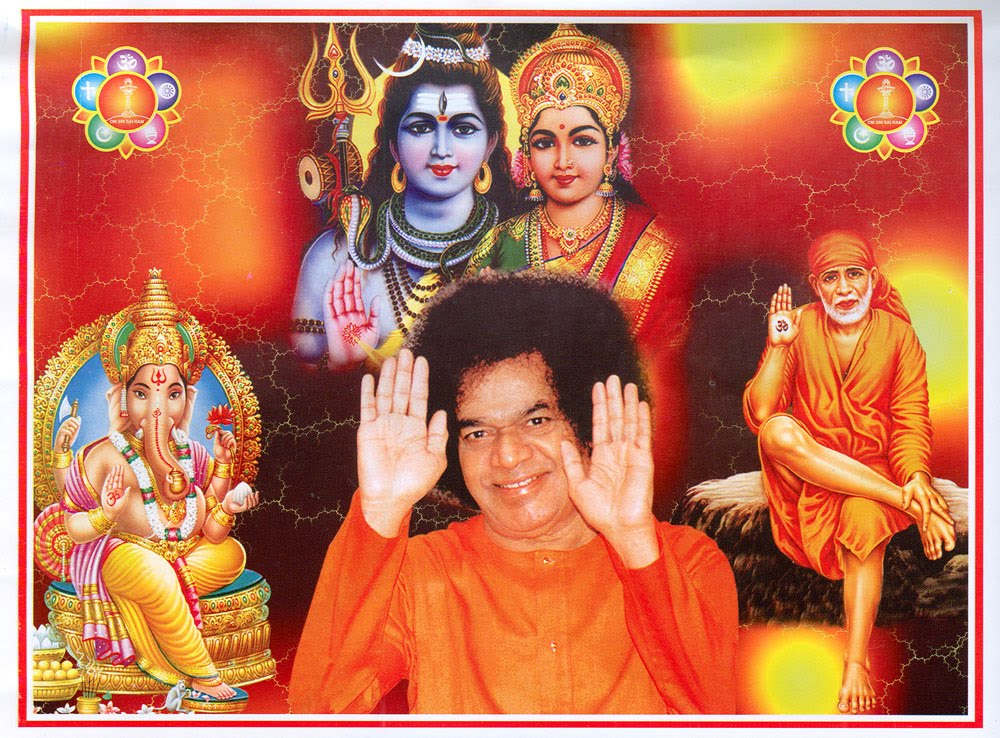|
|
Loving Sai Ram and greetings from Prashanti Nilayam. Welcome once more to our Q and A session and this time we have three questions in our bag. As earlier, the questions broadly touch upon the same theme, and of course, therefore have some overlap. I shall first read out the three questions and then take them up for response, one by one. The questions I shall be dealing with today are as follows:
QUESTION 1: How can we make the atma control the mind and the body?
QUESTION 2: Why is man still attached to the world when he knows well that he must reach God?
QUESTION 3: How can we understand the principle of “I AM I”?
Let me start with the first question namely, how do we put the atma in the driving seat and make it control our mind, senses, and the body. Evidently, the questioner knows, as Swami has told us ever so often, that the human being is a composite of three entities, namely the gross body plus the senses, the subtle mind and the even more subtle atma, that forms the core, as it were, of our personality, and indeed our entire nature.
 |
The question now is among these three, who bosses whom and what is the pecking order? There are basically two options, the first of which is atma first, mind next, and body-cum-senses last; in fact this is the order God wants us to follow. However, in reality, more than 99 % of humans adopt a different hierarchy in which the body and the senses come first, the mind next, and as for the atma, it is sidelined if not shut out.
God wants us to follow a particular hierarchy with good reason; and that reason is that this approach would lead us to Him, and eventually unite us with Him; and once that happens, we would be in bliss for ever. Of course, this is not a cakewalk and one has to strive hard, an important portion of which is strict sense and mind control. Both the senses and the mind do not like this discipline one bit, and that precisely is where all the troubles start.
It was thousands of years ago, and it is so even now; only, the difficulties of taming the mind at the present time have become Himalayan, thanks to huge industries that have come up for pandering to the senses. And of course there is the media which constantly parades all these “goodies and attractions” both via titillating stories and massive advertising. What the questioner wants to know is how, in the midst of this huge storm created by the wrong hierarchy, can one stick to the agenda that God want us to, which is to put atma in the primary place.
This is a very good question and I would like to deal with it in stages. Firstly, why do the senses and the mind gain ascendance over the individual and manage to establish themselves on the throne reserved for the atma? Next, what happens as a result? And finally, how to set things right, which is really what the questioner wants to know.
It all starts with the fact that everyone without exception always wants to be happy; I mean who would want to be miserable and strive for mental depression? On the other hand, people do make a lot of effort to seek happiness. The question now becomes, “Where do I find this happiness?” Even as one is asking oneself this question, a lot of agents appear suddenly, seemingly from nowhere. Actually, these agents are lurking in the corners of the mind and waiting for an opportunity, and once they get an opening, they unleash their full marketing force.
The agency that gets busy to lead man up the garden path has no formal name but we might call it, Desire Inc. The agents of this powerful corporation come out, complete with brochures and all the information one would want, and start a never-ending campaign. One agent would say, “Sir, if it is happiness you want, I can tell you where exactly to find it. It is in this bottle; just try it, and see how many heavens become accessible to you?
 | |
Desire Inc. is designed to cater to the mind and senses while forgetting the atma |
You do not have to perform any yagas and yagnas (sacrifices or rituals) to go to heaven after you die. You can have heaven right now. This is an offer you simply cannot refuse!” And so on it goes, with agents of Desire Inc. tempting humans to try sense gratification of various kinds.
Man falls for this, forgetting completely why God gave him the senses and the body. Instead, he allows his senses and the mind to be completely under the control of various enemy corporations, of which Desire Inc. is just one.
So, what is the net result? It all starts off appearing to be fabulous but soon there is trouble which thereafter sticks to the individual like a leech. Once trouble attaches itself, it is quite difficult to remove it, and so, if one were sensible and wise, he or she would do all that is necessary to avoid getting into trouble in the first place.
The reader might say, “OK, all this is fine, I know about it all since I have heard it so many times in Baba’s discourses. What I want to know is how to produce a regime change, kicking out the mind from the throne and installing atma in its place; anyway, God intended the atma to sit there and rule; how do I make that happen? Got any ideas?” I must necessarily now attend to that part of the overall issue.
According to me, the first step in this is to recognise, that by having a wrong operating system, we have got it all wrong. That is to say, we must first of all be conscious of the enormous mistake we make when we keep the atma out and install the mind as the boss of our destiny. Having recognised this fatal mistake, we must next do all we can to make the mind vacate that spot – not easy but the effort must be made.
Now, desires invariably breed addiction; thus people acquire addiction to drinking, drugs, gambling and so on. How to get rid of these terrible and well-entrenched bad habits? Swami gives a nice strategy. He says: “Suppose every morning as you sit down with your newspaper and cup of tea, a stray dog walks into your room. It wags its tail and touched by it you throw a biscuit. The dog eats the biscuits and feels very happy.
Next day, the same thing happens and soon the dog becomes a regular visitor; it has got used to the habit. Not only that, it becomes a nuisance as well. If some day you are busy doing something else, it barks loud, disturbing everybody. One day, you child might be sick and you are rushing to the doctor, but the dog is there, insisting on its feed; and incidentally, the demand of the dog has grown; it is no longer satisfied with just one biscuit; it wants many. You are now sick and tired of this dog and are desperate to get rid of the dog once and for all, but do not know how to.”
Swami says there is a simple trick for dealing with this problem – just deny the dog what it is demanding from you. Next time you are with the paper and sipping tea and the dog shows up, just ignore it; the dog would do all it can including rolling over, to catch your attention but just ignore it and make it frustrated. Do it one day, two days, three days and so on; slowly, the dog would get frustrated and stop bothering you, and try to find some other “customer”.
In fact, Swami has summarised this recipe into a neat formula that has just two words: Daiva Preethi and Paapa Bheethi, meaning respectively, “Love of God” and “Fear of Sin”. How does this magic formula operate? Swami says it is really simple. When you love God dearly, and I really mean dearly, then when some temptation arises you would tell yourself, “Maybe I can indulge in this but would God be pleased?
 | |
Can we show our love for God in all that we say and do? |
He would not; on the other hand, He would be most disappointed, saying I gave this fellow this most precious life so that he could purify himself and become united with Me for ever; instead, he is simply blowing away his golden opportunity!” In short, the first step in restoring control back to the atma is to develop a strong love for God.
This love must not be an intermittent affair, like erratic electric power that comes on and goes off quite unpredictably. On the contrary, it must be both strong and steady.
OK, what about the second part of the formula, namely the Paapa Bheethi or “Fear of Sin”? Well, that is a natural corollary to love for God, is it not? I mean if we really love God, how can one ever indulge in sin? Thus, fear of sin must go hand in hand with love for god. This raises an important question: “What exactly is sin?” If this question is asked, most people would rapidly list all the standard list of sins ranging from theft and stealing to gambling and adultery.
All these are no doubt undesirable traits and must be avoided; however, sin means much more. In a larger sense, sin means any act that would displease God and delay our union with Him. Seen from this perspective, being selfish is a sin. Similarly, being angry or jealous is a sin and so on. In the Twelfth Chapter of the Gita, Lord Krishna spells out crisply all the specifications for becoming dear to Him. If we violate anyone of those, then we are committing a sin.
What it all boils down to is that if we really love God, we would think a thousand times before doing anything that is not pleasing to Him. So, at the end of that somewhat elaborate discussion, I would say we just have to start loving God dearly and do all we can to stay away from anything that God would not like us to do. If we get that right, then we are well on the way to restoring the atma to its rightful position in the internal hierarchy!
I hope you made some sense of all that! Let me now move on to the second question which is:
QUESTION 2:
Why is man still attached to the world when he knows well that he must reach God?
ANSWER:
 | |
“Has life been given by God to humans just for eating, drinking, sleeping and dying?" |
I believe I have earlier already touched upon aspects of the answer to this question; nevertheless, I shall repeat all that once more since this is an important question. In fact, this is a standard problem. Let me start with the second part of the question for that contains the clue. The questioner says in that part, “When he knows well that he must reach God?” I wonder. I mean if one were to do a poll and ask, say, “Do you know the purpose of life?” how many of them do you think would say the purpose of life is to go back to God?
Or, suppose one asked, “Do you know that you are supposed to become one with God eventually?” I am sure 99.9999 % of the people polled would simply be unaware of it! And that is exactly where the problem really starts. So really speaking, we should first ask, “What is the purpose of life?” or “Why has God given this life?” and so on; and after having asked that question, seek to answer it seriously.
Actually, Swami has dealt with this question several times. In His discourses, Swami has often asked, “Has life been given by God to humans just for eating, drinking, sleeping and dying [khana, peena, sonaa aur marna]?
God expects something more from the life gifted to man? What is that something?” That is what Swami has explained in detail in not only His discourses but also in many of His Vahinis, particularly the Gita Vahini. I cannot obviously deal with all that in detail here but would confine myself to the core issue, which is the pursuit of happiness.
The famous Declaration of Rights prepared by the founding fathers of America talks of fundamental entitlements of all human beings, which includes life, liberty and the pursuit of happiness. Yes, much of life is conditioned by man’s quest for happiness. Like most valuable things available in the market today, we have in the “happiness bazaar”, if I may say so, only fake happiness.
 | |
Humans are ignorant about the true purpose and pursuit of happiness |
What do I mean by fake happiness? Suppose a person buys a gold ring thinking it to be made of gold, because the salesperson said so. Actually, the ring is made of brass and simply plated with gold. So, after a while, the gold covering comes off and all that remains is the brass ring! Clearly, the buyer has been taken for a ride. In the happiness market too, there is the genuine stuff and umpteen fakes.
The fake stuff is the temporary happiness that is available in plenty in the transient world, while the genuine stuff as I call it is ‘bliss’, is available only when one unites with God. By giving the human form to us, God in His infinite mercy is giving all of us a chance to become one with Him and enjoy permanent bliss.
But man does not understand that, and, misled by the mind [which is very good at selling fakes], he gets duped and goes around looking for permanent happiness in an impermanent world. Man thinks he can get God in this world on his terms, and that is the fundamental mistake he is making. And that mistake is being made because man insists on being spiritually ignorant.
What is this ignorance am I talking about? It is the belief that what seems real, namely the world, is actually real; no, it is not. It is God who is the basis of this world, who is Real, though He might not be seen. In short, man is attached to the world on account of ignorance and delusion. He may want to reach God, but if he adopts the wrong methods, how can he?
I now come to the last question in today’s session, which is:
QUESTION 3:
How can we understand the principle of “I AM I”?
ANSWER:
The phrase “I am I” might sound mystifying to many who are hearing it for the first time, and so, maybe, I should make some comments on it. Suppose you were to ask someone you come across the question, “Who are you?” Most likely, the person would begin by saying, “I am so and so,” and in the process give his name. Did this man appear in this world with that name tag attached to his body? No; the name he bears, as Swami often reminds us, was given to him by his parents, after his birth.
Ask anyone his name, and he would reply, “I am Smith,” or “I am Amar,” or whatever. Notice, that everyone, no matter who he or she is, always starts with the word “I”. It is always: I am Smith, or Amar. That “I” is common to all; bear this point in mind and I shall come back to it soon.
 | |
By conquering our desires, we weaken the mind's control over us, allowing the divine light to shine through |
Let us now turn to God. God, as we all know, is both formless and nameless [it is a different matter we give Him all kinds of names!]. Suppose God were to appear before us and we ask Him, “Who are You?” How do you think He would reply? He cannot say “I am so and so” and give a name for He has none. He would simply say, “I am I”. That of course would not make much sense to us; but suppose God were to put it this way: “You want to know who I am? Well, when you answer ‘I am Rama’ or ‘I am Krishna’ who is that ‘I’ you are referring to? Have you ever thought about that?” Understanding the “I am I” principle boils down to answering the question I just posed.
Let us go back to the answer “I am Smith,” or “I am Rama”. Suppose the person says instead, “You asked me who am I? Well, I am really three entities combined into one. These entities are: 1) The atma, which is really the core of my personality, 2) the mind, and 3) the physical body that you see before me. If you are asking me about my body, then that body answers to the name Smith. When I go around in the world, that is the name I use for operational purposes.
However, if you want to know about the Real me, that is the atma. Thus, even when I say, “I am Mr. Smith,” I should really say, “I am really the atma, but this atma is encased in a body that goes by the name Mr. Smith. I certainly am Mr. Smith for worldly purposes, but in reality I am actually the atma or God.” Indeed, it is in recognition of this that Vedanta declares, Aham Brahmasmi, meaning, “I am God”.
Given all this background, the question I am trying to answer now becomes, “How do I realise I am God?” This is an important point. Swami has told us many times, “You are God”. Surely, that fact must have registered in our heads. However, that does not mean we realise that we are God! That realisation would come only when we quite naturally act like God. What does that mean? It means we act with zero selfishness, with absolutely no anger or hatred ever to anyone, are always full of love for all, and see all to be alike, are ever compassionate and full of forbearance and so on.
These things must become quite natural, almost like breathing; are we ever conscious that we are breathing? And yet we are breathing all the time, aren’t we? If in the same way Pure Love becomes a natural part of our life, then we become God even if we have a body, and that body answers to a particular name, Smith, or Akbar or Rama, whatever it be.
I am not sure if I got through, but I do hope that I have at least given you enough to think about!
Dear Reader, how do you like this series? Does it help you in any way? Do you have any spiritual questions which need clarification? Please feel free to write to us at h2h@radiosai.org mentioning your name and country. Thank you for your time.






















No hay comentarios :
Publicar un comentario